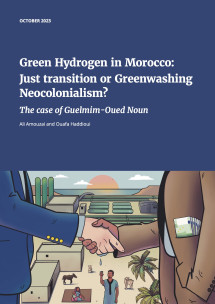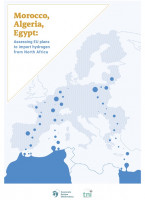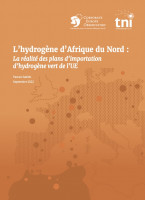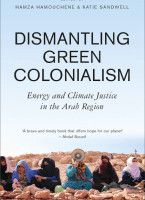Green Hydrogen in Morocco: Just transition or Greenwashing Neocolonialism? The case of Guelmim-Oued Noun
Regions
Morocco’s heavy reliance on imported fossil fuels for over 90% of its energy needs makes securing domestic energy supplies a top priority. Yet, the country's plans to export more than 70% of its green hydrogen production to Europe by 2050 raise questions about this commitment.
In Guelmim-Oued Noun, a semi-arid region in southwest Morocco, a significant transformation is underway. Historically sustained by agriculture and livestock, this area is spotlighted as a green hydrogen hub, primarily to meet Europe's energy demands. European companies are embarking on expansive projects, raising significant concerns about neocolonial influence, unequal development, and complex geopolitical dynamics.

Downloads
-
Green Hydrogen in Morocco: Just transition or Greenwashing Neocolonialism? (PDF, 1.23 MB)Average time to read: 38 minutes
-
L’hydrogène vert au Maroc: Transition juste ou écoblanchiment néocolonial? (PDF, 1.23 MB)Average time to read: 38 minutes
-
المغرب: الهيدروجين الأخضر، أو طليُ النيوكولونيالية بالأخضر (PDF, 3.48 MB)Average time to read: 38 minutes
Authors
Presented as a sustainable energy evolution and a development opportunity for Morocco, the narratives surrounding green hydrogen require rigorous scrutiny. This case study explores the geopolitical implications obscured by the promising rhetoric on green hydrogen in Morocco. Beneath this eco-modern facade lies a strategic alliance between European entities, corporate giants, and Moroccan elites.
The rush towards green hydrogen as a global energy solution brings complex challenges, often at the expense of local communities and ecosystems. Land and water exploitation become pressing issues. Additionally, transparency issues perpetuated by both the state's political apparatus and private companies further complicate the situation.
Key Findings:
- Morocco’s green hydrogen agendas are significantly influenced by European interests, highlighting concerns about neocolonial influence, uneven development, and complex geopolitical dynamics.
- The development of green hydrogen in Morocco involves a complex interplay between the state, local elites, and international capital, emphasizing the profit-driven nature of the energy transition.
- The export-oriented nature of green hydrogen projects in Morocco has significant economic implications, as they remain reliant on market volatility and external demand.
- Large-scale green hydrogen projects in Morocco are sidelining local communities and ecosystems, raising concerns about land use, water resources, local development, and the displacement of local communities.
- Transparency issues and the marginalization of local voices in decision-making processes are undermining the democratic nature of the energy transition.
Energy Transition in Morocco must revisit its approaches, aiming not just for change but for a sustainable energy future rooted in principles of justice, equity, and environmental sustainability. A sustainable and just energy transition requires a thoughtful and inclusive approach that deconstructs existing energy structures and builds upon them. This process should involve local communities and prioritize justice and equity for people before profit.


